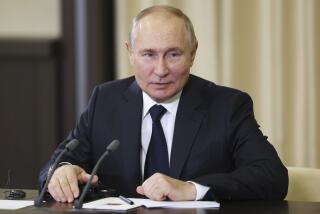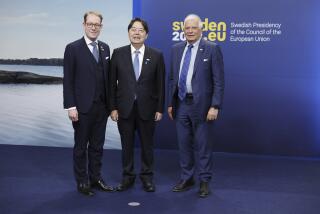Kaifu Presses China to Improve on Human Rights, Vows Cooperation : Diplomacy: The visiting Japanese premier also asks Beijing to help limit international arms sales.
- Share via
BEIJING — Japanese Prime Minister Toshiki Kaifu said Monday that his nation seeks closer economic and diplomatic ties with China, but he urged China to facilitate such cooperation by improving its human-rights record.
“Japan will cooperate as much as it can in China’s policies of reform and opening to the outside world,” Kaifu said at a news conference.
Kaifu added, however, that during his visit here he “said very frankly” to Chinese Premier Li Peng that the major industrialized democracies, including Japan, “are still seriously concerned about the human-rights situation in China.”
Kaifu said that he strongly urged Chinese leaders “to work hard in the field of democratization and human rights” in a way that will be “clear and understandable to the world community” in order to regain international prestige.
Japan has urged its Western allies to restore normal political and economic ties with China despite continued international anger over the June 4, 1989, army massacre of pro-democracy demonstrators in Beijing. Kaifu appeared to be seeking a response from China that would enable Tokyo to move further along the path of warmer ties.
Sadaaki Numata, a spokesman for the Japanese prime minister, told reporters in a separate briefing that Kaifu was pressing Chinese leaders to show visible improvements in human rights “so he can tell the world that further efforts are being made.”
During his visit, which began Saturday and ends today with Kaifu flying on to Mongolia, the Japanese prime minister also sought Chinese cooperation in limiting international arms sales.
China announced Saturday that it has decided “in principle” to join the Nuclear Non-Proliferation Treaty.
Chinese Foreign Ministry spokesman Wu Jianmin said at a news briefing Monday that China also supports the idea of “some proper international control on the transfer of (conventional) weapons.” Wu added that China is studying a Japanese proposal for the United Nations to establish a public register recording all international weapons transfers, but he did not express support for the proposal.
At his news conference, Kaifu reiterated a Japanese policy, first announced this spring, of linking development aid with the records of receiving countries on such issues as arms sales and human rights.
China is both a major exporter of conventional arms to Third World nations and a major recipient of Japanese aid. Although not calling into question aid already promised to Beijing, Kaifu’s statement appeared to link any future promises of aid to the new principles.
The new, four-point Japanese policy declares that Tokyo will look at a country’s arms trade, military spending, development of weapons of mass destruction and human rights performance when deciding aid.
“Our basic philosophy . . . is that a nation should not waste its own human, natural and other resources . . . on too much military spending,” Kaifu said.
Japanese sources traveling with Kaifu said it was significant that Kaifu explicitly outlined Tokyo’s aid policy while in China.
Communist Party General Secretary Jiang Zemin, in a meeting Monday with Kaifu, expressed an upbeat assessment of the future of Sino-Japanese relations, specifically citing cooperation in economic, cultural, scientific and technological fields.
“The two countries have much in common culturally; Japan has a deep understanding of China’s ancient culture, and the two countries are close geographically,” Jiang said, according to a New China News Agency report paraphrasing his remarks. “So, there are many favorable conditions for developing cooperation.”
Jiang also thanked Kaifu for his efforts to lift international economic sanctions imposed against China after the 1989 crackdown, Japanese officials said.
In meetings with other members of the Group of Seven major industrialized democracies--Britain, Canada, France, Italy, Germany and the United States--Kaifu has argued that China should not be kept in isolation.
After a Monday evening meeting between Kaifu and Chinese President Yang Shangkun, Japanese spokesman Numata indicated to reporters that the two leaders viewed Kaifu’s visit as having brought relations between the two nations to a “new stage.”
“We believe this marks the beginning of a substantive policy dialogue on a whole broad range of policy issues between the two countries,” Numata said. “We share the broad goal of contributing to peace and prosperity in the world.”
More to Read
Sign up for Essential California
The most important California stories and recommendations in your inbox every morning.
You may occasionally receive promotional content from the Los Angeles Times.













